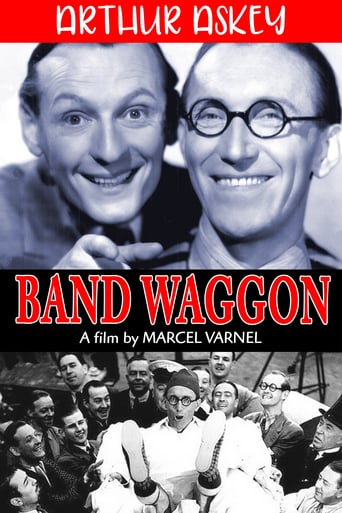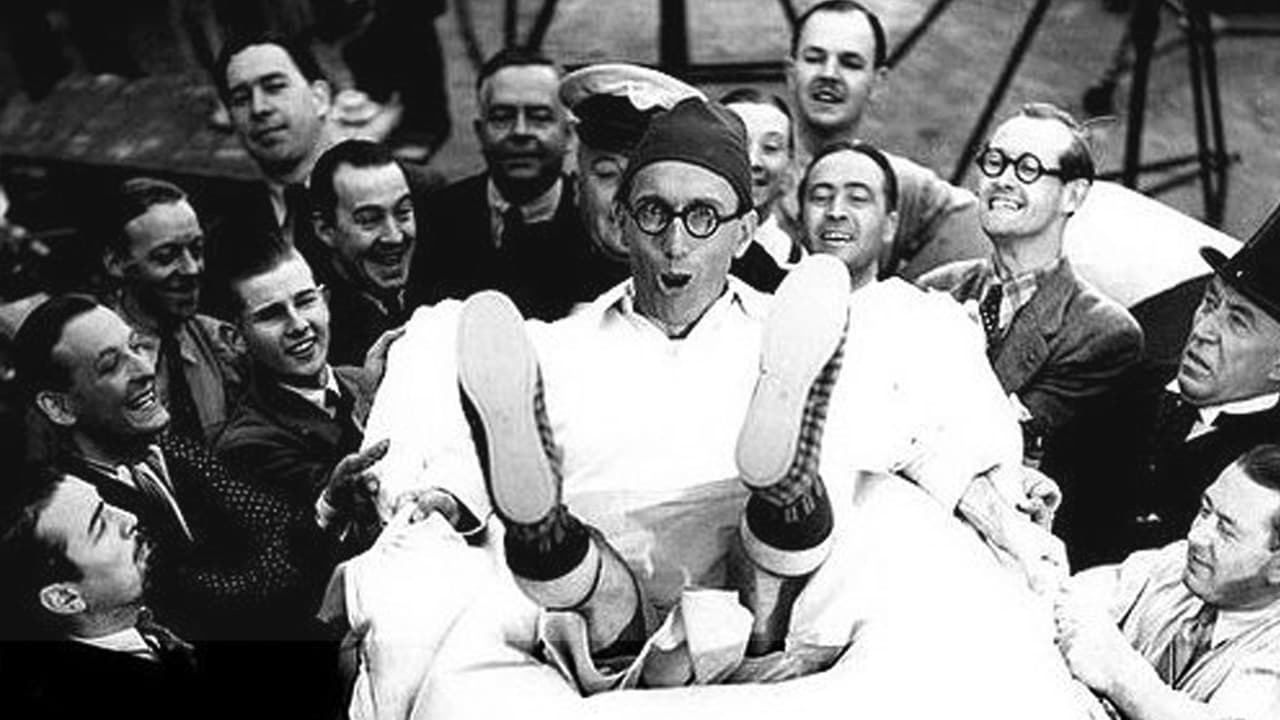alexanderdavies-99382
"Band Waggon" marked the cinema of vaudeville entertainer Arthur Askey and his comedy partner Richard Murdoch. The title of the film is taken from a successful radio comedy from the B.B.C, staring Askey and Murdoch.
The plot is absolutely non-existent as this vehicle is merely a way of advertising new talent from "Gainsborough" studios.
The whole thing has dated badly and the comedy is outnumbered by those bloody music numbers - with less than successful results! Every time someone begins singing, I immediately fast forward my DVD of "Band Waggon."
Moore Marriott makes another appearance as Harbottle but is thoroughly wasted, as is Peter Gawthorne. Both actors were put to FAR better use in Will Hay comedies.
The subplot about a group of Nazis hiding out in a supposedly haunted house is both lame and poorly handled. It was only added into the film as an afterthought.
The only remotely positive thing I can throw in the film's direction, is that at least Arthur Askey and Richard Murdoch are able to communicate on the same wavelength as each other. In hindsight, they should have stayed together for more films after 1941.
A curious museum piece but nothing more.
Mart Sander
Arthur Askey's films must have a lot of sentimental value, but his comedy hasn't aged well. In fact, he's very irritating in most of his films. What makes The Band Waggon interesting, is the only opportunity to see the greatest British dance band leader Jack Hylton and his orchestra in their only screen performance. It's a pity they didn't do more films. The songs aren't great hits, but solid good material. The other thing that makes this film interesting is its fascination with the television. It's one of the very first films, where TV is the leading character. Sure, the process is shown in a fantastic manner which is very far from the reality, but it's great fun to watch the final sequence. The overblown showstopper Melody Maker Man - dozens of performers busting their arses while the only member of the audience fails to utterly notice the goings-on around him - is an often used gimmick, but very funny indeed. Be sure to watch the proper DVD release and not a bootleg copy.
MartinHafer
A couple years ago, I discovered that there are lots of wonderful films free for download in the public domain. Among these are a lot of films from Gainsborough Pictures. While I like the Will Hay ones quite a bit and am glad I discovered his film, for the life of me I cannot understand the appeal of Arthur Askey. Perhaps if I were a Brit and grew up with him--all I know is that the 6-8 films of his that I have seen simply don't appeal to me. And, I am not sure I'll ever acquire a taste for his style of singing and mugging.Apparently, Askey became famous for his BBC show "Band Waggon" and this is a movie that is based just a tiny bit on it--though it's complete fiction. The film finds a group of musicians out of work--the same can be said for Askey and his partner, Richard "Stinker" Murdoch. But the two groups don't find each other until much later in the film. In the meantime, Murdoch and Askey have a run-in with a seemingly haunted castle. It really isn't, but Moore Marriott runs about the place scaring people and pretending to be a ghost. I really wish they'd done MUCH more of this, as Marriott is a very funny supporting actor and I would have enjoyed more humor and far less singing in this film. Regardless, the pair run away from the castle and meet up with the unemployed musicians. Then, they learn that the ghost was NOT a ghost and they and their musician friends return to the castle. There they find TV equipment (something still in its infancy) and decide that instead of asking more questions, they'll just put on a show and broadcast it. In the meantime, there are Nazi spies running about--and the equipment is theirs--as are some stolen secret plans. It all becomes very confusing and instead of really straightening it all out, they have a long series of musical and comedy sketches they broadcast to Britain.I think my biggest problem with the film was Askey, though all the singing didn't help, either. Askey was just obnoxious--loud, unfunny and talentless. His singing in the quintet was a skit with no humor and he just came off as a boorish idiot. In fact, I found it a chore to watch--except when Moore Marriott was in the film. Overall, a bad film that ages very poorly. It's incoherence and bizarre plot was not a problem (after all, I liked "Hellzapoppin" with Olson and Johnson) but Askey was. What a horrible little man.
Spondonman
This was a spin off from a pioneering BBC musical comedy radio series with Arthur Big-Hearted Askey and Richard Stinker Murdoch as the stars which ran for 55 episodes in 1938/39. Sadly as usual very little survives of those broadcasts, but we can get a flavour of the madness from this film. I taped this on 7th February 1987, in the days when BBC TV used to show Golden Age films at reasonable hours without reason or introduction, and my daughter and I must have seen it more than umpteen times since.Big and Stinker are discovered after months of living on the roof of Broadcasting House with their chickens and Lewis the goat, waiting for their chance at stardom. On their subsequent aimless travels in their overladen car, the Askeytoff II, they end up renting the haunted Droom Castle for the princely sum of £3. The perfectly natural explanation for the ghost is that Nazis are at the bottom of it all (in the basement), using a TV hook-up to Berlin of course. Arthur has a much better idea: put on a pirate TV station and broadcast a music show that night in competition with the stuffy old BBC. Jack Hylton (and Louis Levy!) and his band plus the then 18 year old Pat Kirkwood were used well in The (very long) Melody Maker, Band Waggon, Heaven Would Be Heavenly, The Only One Who's Difficult Is You, A Pretty Little Bird Am I and Boomps-A-Daisy. It must have seemed a little strange when released in March 1940: BBC TV had closed down 2 days before War with Germany was declared in September 1939 and Band Waggon had ended its radio run in the November. Favourite bits: Big and Stinker waking up to another day's idling on the BBC roof; entering the castle for the first time; the Old King Cole oratorio; Pat Kirkwood in pirate costume; Arthur on a dusty organ reprising his Big-Hearted theme song. A few of his routines can sound very camp this side of WW2, but there won't ever be another like him. Jack Hylton's recording career began in 1921 but he only made a dozen more recordings after doing the 78's for this - the vibrant British Dance Band scene had shifted to flat foxtrots, American Swing and Latin American rhythms and the War seemed a good time to change jobs too. Pat Kirkwood died Christmas 2007 as the last survivor of this film, indeed of pre-War British musical comedy. In these days when the Queen showers honours like confetti on rugby players and myriad chancers alike Kirkwood's 60 year career was rewarded with a 60 year grudge.This was one of Arthur's best films with Ghost Train and Back Room Boy still to come and well worth the price of the budget DVD to see what made him and Murdoch tick, along with plenty of pre-War humour and a rather quaint view of television.


 AD
AD


